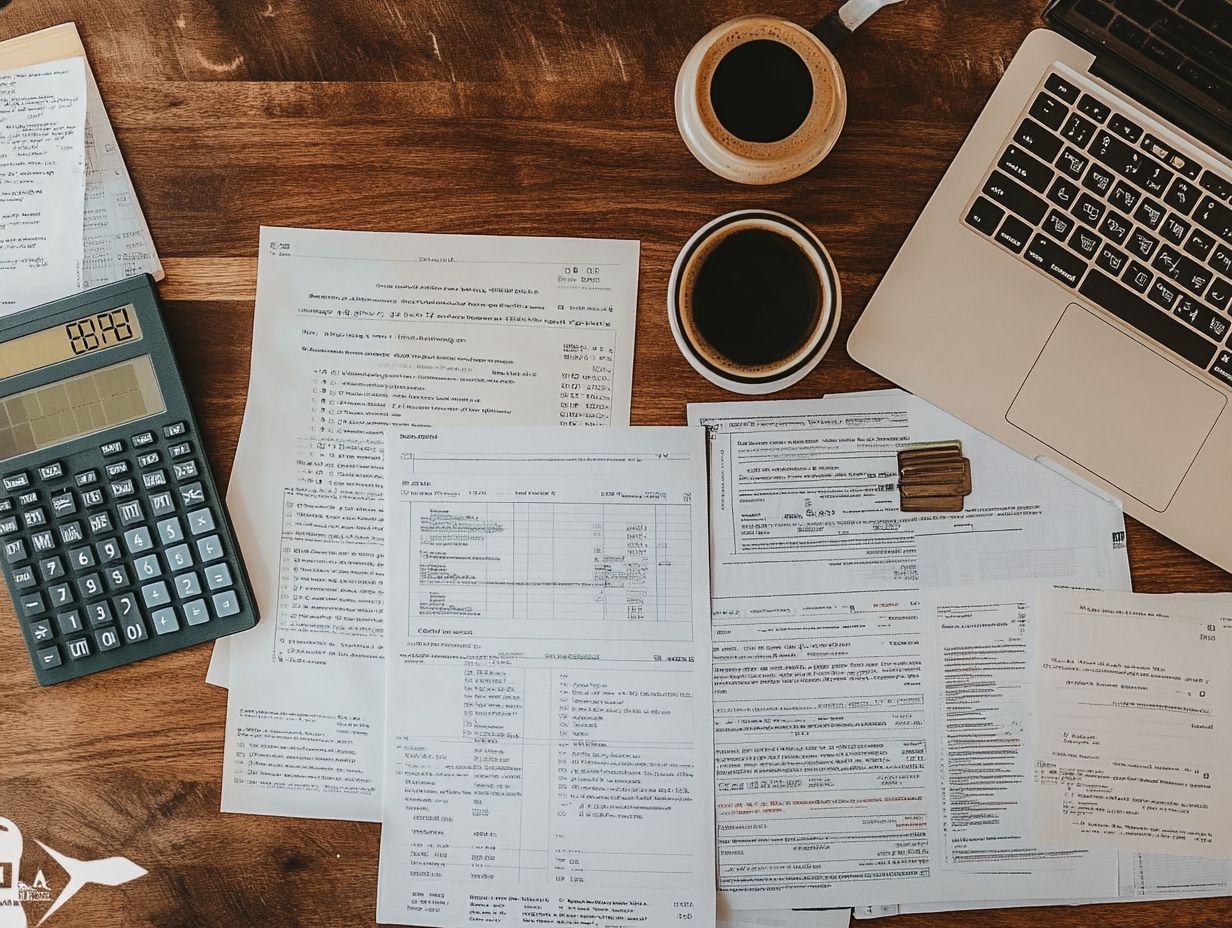Freelancer Tax Strategies for the Self-Employed
Navigating the realm of taxes as a freelancer can indeed feel overwhelming, particularly if you’re accustomed to the straightforward structure of traditional employment. However, with these unique challenges come distinctive opportunities, such as maximizing deductions and grasping your estimated tax responsibilities.
This guide will provide you with essential strategies that every freelancer should be aware of. It includes common deductions, effective tips for organizing your finances, and the undeniable value of collaborating with a tax professional. By staying compliant, you’ll uncover ways to optimize your tax savings and make the most of your hard-earned income.
Contents
- Key Takeaways:
- Understanding Taxes for Freelancers
- Common Tax Deductions for Freelancers
- Organizing Your Finances for Tax Season
- Maximizing Tax Savings as a Freelancer
- Paying Estimated Taxes as a Freelancer
- Working with a Tax Professional
- Staying Compliant with Tax Laws
- Frequently Asked Questions
- What is considered self-employment income for tax purposes?
- Do I need to pay taxes on my freelance income?
- What is self-employment tax and how is it calculated?
- What expenses can I deduct as a freelancer?
- How can I keep track of my self-employment income and expenses?
- Are there any special tax deductions or credits available for freelancers?
Key Takeaways:

- It s crucial for freelancers to grasp how their taxes differ from regular employees.
- Taking advantage of common tax deductions can significantly reduce your tax liability.
- Organizing finances and using tools for tracking income and expenses can make tax season easier for freelancers.
Understanding Taxes for Freelancers
Understanding taxes as a freelancer is crucial for successfully navigating the complex financial rules of working for yourself in the United States. Freelancers encounter unique tax obligations that can differ significantly from those of traditional employment.
This demands a solid grasp of the relevant tax laws, especially those enforced by the IRS. You must report your income accurately and comprehend your deductions, while also being aware of the potential tax benefits available to you.
It s equally important to consider the legal structure of your freelance business whether you operate as a sole proprietorship, LLC, or S corporation. This can optimize your tax situation and ensure compliance.
Difference from Traditional Employment
The primary distinction between freelancers and traditional employees lies in their employment structure, tax obligations, and the income reporting processes dictated by the IRS.
Freelancers face unique challenges when managing their taxes, mainly because they lack the employer withholding that regular employees benefit from. This absence of automatic deductions requires freelancers to be proactive in setting aside funds for their tax liabilities. To navigate this, consider maximizing deductions as outlined in a freelancer’s guide.
They are subject to taxes that freelancers must pay for both the employer and employee portions of Social Security and Medicare. Understanding these intricacies is vital; freelancers must file their tax returns independently and often navigate the complexities of top tax mistakes freelancers make and various deductions, along with managing quarterly estimated payments.
By recognizing the implications of self-employment on overall tax obligations, you can make informed financial decisions. This ensures compliance while optimizing your earnings.
Common Tax Deductions for Freelancers
For freelancers, grasping the intricacies of common tax deductions is essential for minimizing taxable income. This enhances the financial advantages tied to their freelance endeavors.
These deductions can cover a range of business expenses, from everyday costs associated with running a home office to client meals and even educational expenses that bolster professional skills.
By identifying which expenses qualify as tax-deductible, freelancers can unlock substantial savings and navigate their tax obligations with greater ease and confidence.
Expenses That Can Be Deducted
Understanding which expenses you can deduct from your taxable income is a game-changer for freelancers. This can significantly lower your overall tax obligation to the IRS.
For instance, if you’ve invested in essential equipment like computers or cameras, those costs are deductible, allowing you to recoup some of your professional expenses. Software subscriptions that are vital for project management and design also fall into the category of deductible expenses.
And don’t forget about travel costs incurred while meeting clients or attending conferences; these can also help you trim down your taxable income. Following IRS guidelines is crucial for ensuring that these deductions are properly documented.
This makes accurate accounting and bookkeeping practices essential. By keeping meticulous records of your expenses, you can confidently navigate tax season and maximize your deductions to their fullest potential.
Organizing Your Finances for Tax Season

Organizing your finances for tax season is essential for freelancers. It helps you streamline your tax filing and maximize potential deductions.
Set up a system to track your income and expenses throughout the year. This way, you can avoid the last-minute chaos that comes with tax time.
Leveraging financial software and maintaining precise bookkeeping records can greatly simplify this process. This enables you to concentrate more on expanding your business instead of getting tangled in tax preparation.
Tools and Tips for Tracking Income and Expenses
Freelancers like you can harness a variety of tools and tips to effectively track income and expenses. This ensures compliance with tax obligations while maximizing deductions.
One essential step is selecting reliable accounting software, such as TurboTax or H&R Block. These tools are specifically designed to simplify tracking and categorizing your finances. Establishing a bookkeeping system that meets your unique needs can also make a world of difference.
Track key expenses, such as:
- Travel
- Supplies
- Marketing
Maintaining organized records whether digital or physical is crucial. This means consistently uploading receipts and invoices to avoid frantic moments when tax season rolls around.
By adopting these practices, you ll enjoy a more seamless tax filing experience and gain valuable insights into your financial health.
Maximizing Tax Savings as a Freelancer
Maximizing your tax savings as a freelancer requires a clear understanding of various tax strategies. Leverage available credits and deductions to reduce your overall tax liability effectively.
Engaging in proactive tax planning can be highly beneficial. Consider exploring options such as retirement plans. These not only help build your financial future but also offer immediate tax advantages.
By managing your finances strategically throughout the year, you can position yourself for substantial savings when tax season arrives.
Strategies for Reducing Tax Liability
Freelancers have a wealth of strategies at their disposal to reduce tax liability. This ensures they keep more of their hard-earned income.
Maximizing deductions think home office expenses, equipment costs, and travel expenditures can considerably lower your taxable income. Embracing accounting software is not just about effective record-keeping; it also offers insights into your spending that could reveal additional deductible expenses you might not have considered.
Consulting with tax professionals can greatly help. They guide you through the intricate maze of tax codes and help you identify credits like the Earned Income Tax Credit or the Qualified Business Income deduction.
For example, meticulously keeping detailed logs of expenses related to your business activities can be a total game-changer as tax season approaches.
Paying Estimated Taxes as a Freelancer
Paying estimated taxes as a freelancer is an essential component of your tax planning strategy. It ensures adherence to IRS requirements while helping you sidestep penalties.
Unlike traditional employees, you don t have taxes automatically deducted from your payments. This makes it vital for you to estimate and pay your taxes quarterly to meet your self-employment tax obligations, which are taxes you need to pay because you work for yourself.
Mastering the calculation of these estimated taxes will enable you to manage your cash flow effectively. This allows you to maintain financial stability throughout the year.
Calculating and Submitting Quarterly Payments

Calculating and submitting your quarterly payments for estimated taxes is essential for meeting your tax obligations.
This process ensures your income is accurately reported and enhances your financial planning throughout the year.
To get started, you first need to estimate your annual income, which requires careful evaluation of your current and future contracts or projects.
Once you arrive at an estimated figure, the next step is to calculate the appropriate payment amount by determining your expected tax liabilities and dividing that by four.
It’s vital to be aware of the various submission methods available to you, including:
- Online payments through the IRS website
- Checks mailed to your local IRS office
- Other electronic filing options
As a freelancer, staying informed about key deadlines is crucial. These typically fall in mid-April, June, September, and January, helping you avoid pesky late fees and interest charges.
Working with a Tax Professional
Collaborating with a tax professional can be an exceptional asset for freelancers seeking guidance on tax strategies and adherence to IRS regulations.
Engaging a Certified Public Accountant (CPA), a professional who helps with tax and financial planning, allows you to receive personalized advice that aligns with your unique financial circumstances.
This support enables you to navigate the intricate landscape of tax obligations while optimizing your financial affairs.
With their expertise at your disposal, you stand to achieve substantial savings and significantly reduce the risk of tax audits or penalties.
Why Work with a Tax Professional?
The benefits of collaborating with a tax professional are vital for freelancers who want to navigate their tax situations with confidence and precision.
By bringing a tax expert on board, you gain access to specialized knowledge that clarifies the complexities of the tax code.
This expertise uncovers potential deductions and credits tailored to your unique circumstances. It translates into significant time savings, enabling you to focus on your actual work rather than getting lost in a sea of tax paperwork.
The financial advantages often far outweigh the costs of professional services. Strategic tax planning can lead to a reduced tax liability.
It’s essential to thoughtfully assess your budget when selecting a tax professional. Choose someone who truly understands the intricacies of freelance work, as this alignment is crucial for maximizing the benefits of such a partnership.
Staying Compliant with Tax Laws
Staying compliant with tax laws is vital! It helps you avoid penalties and keeps you in good standing with the IRS.
Grasping the nuances of your tax obligations and deadlines is crucial for effective tax planning and ensuring timely filings.
It s important for you to remain informed about evolving tax laws and requirements. This knowledge allows you to navigate your responsibilities adeptly and protect your personal assets.
Important Deadlines and Requirements
Freelancers must remain acutely aware of crucial deadlines and requirements to ensure timely tax filing and compliance with the IRS.
The IRS typically requires quarterly estimated tax payments to be submitted by April 15, June 15, September 15, and January 15 of the following year.
By keeping a close eye on these dates, you can manage your cash flow more effectively.
The annual tax return filing date usually falls on April 15, necessitating thorough preparation.
Gathering income records, expense receipts, and other relevant documentation in advance allows for a smoother submission process.
This organized approach ensures that all deductions are appropriately claimed and that you consistently meet deadlines.
Frequently Asked Questions

Don t wait! Start planning your quarterly payments today to maximize your financial success.
What is considered self-employment income for tax purposes?
Self-employment income is money you earn from working for yourself. This includes income from freelance work, independent contracting, or running a sole proprietorship.
Do I need to pay taxes on my freelance income?
Yes, if you are self-employed, you must pay taxes on your freelance earnings. This includes federal income tax, state income tax, and self-employment tax.
What is self-employment tax and how is it calculated?
Self-employment tax helps fund Social Security and Medicare. You calculate it by multiplying your net self-employment income by 15.3%.
What expenses can I deduct as a freelancer?
You can deduct business-related expenses necessary for earning your income. This includes equipment, supplies, travel, home office costs, and more.
How can I keep track of my self-employment income and expenses?
Keeping detailed records of your income and expenses is crucial. Use a spreadsheet, accounting software, or hire a professional accountant to help you.
Are there any special tax deductions or credits available for freelancers?
Yes, self-employed individuals can access specific deductions and credits. You can claim the home office deduction, health insurance deduction, and contributions to retirement plans.






